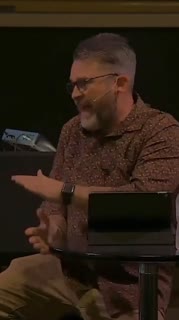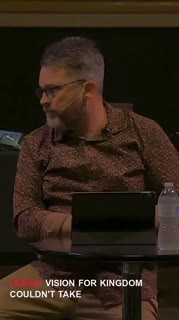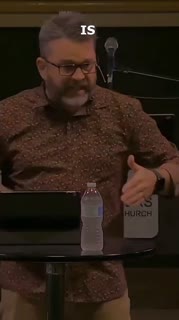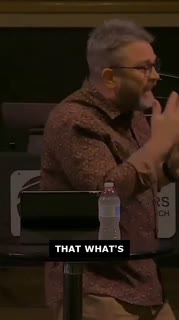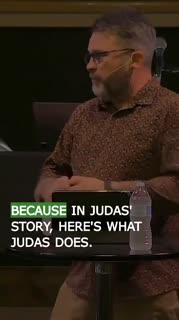Trusting God's Narrative Amidst Betrayal and Expectations
Devotional
Sermon Summary
Bible Study Guide
Sermon Clips
1) "It seems that at this point, in the story, Judas has seen enough. Judas has seen enough of this thing that Jesus is trying to do. We can't possibly know or understand why this moment seems to be the defining moment for Judas, but for whatever reason, this seems to push Judas over the edge. For so long, three years, right? Judas, along with the other 12, has struggled to try and figure out and understand this kingdom concept that Jesus has been trying to teach them. And over and over and over again, they've come to see that this looks nothing like what they expected or that they thought it would be." [07:02] (53 seconds)
2) "Judas' vision for kingdom couldn't take a leader or a king like Jesus. His vision could not support a leader. who would allow a woman to waste precious financial resources on a burial anointing. Because let's think about this, what good is a leader who is dead? So if you're Judas, and you've heard this Jesus guy say, hey, she's prepared me for burial, I'd be like, dude, we can't do anything if you're dead. And I think at this moment, Judas is like, okay, I've had enough. I can't do this anymore." [12:54] (42 seconds)
3) "Empire thinking is power first. first, and then maybe people second. And some of us might think, yeah, that's so bad. Who would want to think about power first and people second? We're Jesus followers. We always think about people first. But I'm not really sure that we do. You see, when we become overcome with empire thinking, we prioritize power, and then we think about people. You see, power allows us, in the same way it would have Judas, to push his own agenda. Would you agree? I don't like Jesus' version of the story. I want my version of the story." [15:19] (34 seconds)
4) "And I believe that what's happening here is just human nature. And we're so hard on Judas. But there comes a point where I think we need to understand that in some ways, we're just like Judas. I know some of you are like, Brian, how can you say such a thing? I'm not trying to be hard on us. It probably feels hard right now, but just stay with me, okay? Judas has a moment where he realizes he's done it wrong. He becomes overcome with grief. He goes back and says, guys, help me fix this. They're like, no, that's your problem." [20:31] (33 seconds)
5) "Because in Judas' story, here's what Judas does. He sells out Jesus so he can write his own story. You see, God calls us to trust the story. He's telling. But what we want to do. is write our own version of the story. That's what we want to do. And I'm not faulting you for wanting to do that. I think we all do it. But what I'm trying to help you understand today is that we have to work toward trusting the story that God is telling, not the version of the story that you want it to be." [23:57] (30 seconds)
Ask a question about this sermon
2) "Judas' vision for kingdom couldn't take a leader or a king like Jesus. His vision could not support a leader. who would allow a woman to waste precious financial resources on a burial anointing. Because let's think about this, what good is a leader who is dead? So if you're Judas, and you've heard this Jesus guy say, hey, she's prepared me for burial, I'd be like, dude, we can't do anything if you're dead. And I think at this moment, Judas is like, okay, I've had enough. I can't do this anymore." [12:54] (42 seconds)
3) "Empire thinking is power first. first, and then maybe people second. And some of us might think, yeah, that's so bad. Who would want to think about power first and people second? We're Jesus followers. We always think about people first. But I'm not really sure that we do. You see, when we become overcome with empire thinking, we prioritize power, and then we think about people. You see, power allows us, in the same way it would have Judas, to push his own agenda. Would you agree? I don't like Jesus' version of the story. I want my version of the story." [15:19] (34 seconds)
4) "And I believe that what's happening here is just human nature. And we're so hard on Judas. But there comes a point where I think we need to understand that in some ways, we're just like Judas. I know some of you are like, Brian, how can you say such a thing? I'm not trying to be hard on us. It probably feels hard right now, but just stay with me, okay? Judas has a moment where he realizes he's done it wrong. He becomes overcome with grief. He goes back and says, guys, help me fix this. They're like, no, that's your problem." [20:31] (33 seconds)
5) "Because in Judas' story, here's what Judas does. He sells out Jesus so he can write his own story. You see, God calls us to trust the story. He's telling. But what we want to do. is write our own version of the story. That's what we want to do. And I'm not faulting you for wanting to do that. I think we all do it. But what I'm trying to help you understand today is that we have to work toward trusting the story that God is telling, not the version of the story that you want it to be." [23:57] (30 seconds)
